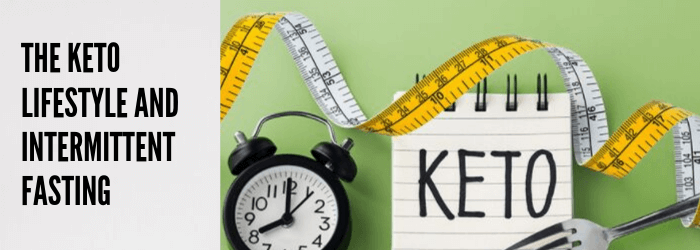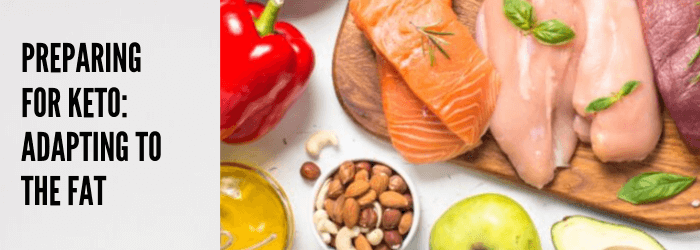The Keto Lifestyle and Intermittent Fasting

The ketogenic diet and intermittent fasting are two methods of losing body fat that have proven wonderfully effective in both clinical studies and personal weight loss journeys.
What is fascinating about the keto diet and fasting as a duo, is that they both rely on ketone bodies to achieve results. When you compliment your ketogenic lifestyle with intermittent fasting, losing fat becomes easier and quicker.
What is Intermittent Fasting?
What is Intermittent Fasting?
Intermittent fasting is when you restrict all calorie intake for a certain length of time. We technically fast every night, when we are asleep. In the world of health and wellness, intermittent fasting is fast becoming a slimming sensation as people across the world dabble in its benefits.
While there are several different ways to approach intermittent fasting as a lifestyle choice, some of the most popular ways are: fasting every other day (alternating model), eating only one meal per day, skipping meals, or setting a time goal like 24 or 48 hours.
Everyone’s body is different, and it is important to find out what works for you at your own pace.

Fasting on Keto
Although not everyone who benefits from the ketogenic diet will benefit from intermittent fasting, everyone who benefits from intermittent fasting by default benefits from ketosis.
The reason for this is that they both use the same ketone bodies made by ketogenesis in the liver, to fuel your cells. The difference comes in where, on a fast, you’re not eating anything, so your body is forced to use fat stores for ketogenesis.
However, when you are eating a diet rich in fat and low in carbohydrates, your body breaks these dietary fats down into ketones for energy, which means you still get calories from food. Either way, your metabolism is in ketosis!
Ketosis, Fasting and Treating Epilepsy
We first started to take serious notice of fasting’s health benefits in ancient times. Records suggest that physicians have been using fasting as a therapy for the neurological disease epilepsy for over 2000 years.
Even before we could look through a microscope and observe them directly, we already knew the seemingly miraculous power of ketone bodies. In the early twentieth century, Harvard scientist Dr. William Lennox published a number of valuable studies on the effect of starvation on seizure frequency.
After looking through a lifetime of evidence he concluded that it must be a change in metabolic processes during the fast that is helping his patients. This conjecture ultimately led to one of the most valuable medical discoveries of our time.
Modern medicine has since moved away from fasting as the primary method of getting into ketosis, and toward the high-fat, low-carb diet we know as keto.
Based on the ground-breaking ideas of Dr. Russell Wilder of the Mayo Clinic, modern medical doctors have been treating epileptic patients, with a prescribed diet rich in fats and virtually devoid of any carbohydrates.
This treatment is still very popular today and has been found to be effective both as a supplement to medication, and, in some cases, replacement of drugs entirely.
Fasting and Weight Loss
When you are on the ketogenic diet, you are training your body to use fats for fuel. After a few weeks of eating minimal carbs and lots of fats, your cells will be well on their way to being fat-adapted.
This means they are primed to use ketones as energy instead of glucose. If you decide to start intermittently fasting while doing keto, you will experience a fat-burning boost second to none. The explanation behind it is simple.
In keto, your liver gradually gets used to the process of turning dietary fats into ketones (ketogenesis), so when you stop eating for a while, the natural way your body is used to getting energy simply has to shift gears.
Instead of burning dietary fat, it now needs to burn stored fat, or rather, it has no other option tat to burn stored fat! This makes intermittent fasting a great option for breaking a weight loss plateau, as your fat-burning metabolic processes make quick work of unused adipocytes (fat cells) you’ve accumulated over time.
Also, when you fast, the levels of certain hormones in your body go up. These are catecholamines, hormones made by your adrenal glands, that activate hormone-sensitive lipase, which initiates lipolysis.
Lipolysis is the breaking down of triacylglycerols into free fatty acids and glycerol to be used for fuel.

More Benefits of Fasting
Along with rapid fat loss and dramatic seizure reduction, fasting has also been shown to have several other health benefits.
Autophagy and Fasting
Autophagy is a vital process which removes toxins and estrogenic chemicals and recycles damaged cell components. In your body, cells degrade and then they recycle any unneeded or dysfunctional proteins and organelles using lysosomes in your blood.
Studies have shown that you can increase the presence of autophagosomes in tissues 4-fold just by fasting for less than 48 hours.
Brain Health and Fasting
While fasting, your body relies on ketones made from stored fat, which are small enough to pass through the blood-brain barrier. One study on fasting found that the expression of genes encoding for mitochondrial enzymes and energy metabolism in the hippocampus were enhanced.
The hippocampus is very important to human cognition in terms of memory and learning, so more mitochondrial activity there would mean more brainpower. Literally!
Final Thoughts
If you are stuck on a number on the scale that just won’t budge, consider trying out intermittent fasting. Although much more research is still needed into the extent of fasting’s medical applications, it’s safe to say that, whether you subscribe to the cookie-cutter “calories in/calories out” model or believe weight is more complex than simple thermodynamics, intermittent fasting will help you lose weight – fast.
References:
Sampaio, Letícia Pereira de Brito. (2016). Ketogenic diet for epilepsy treatment. Arquivos de Neuro-Psiquiatria, 74(10), 842-848. https://dx.doi.org/10.1590/0004-282X20160116
Freeman JM, Vining EPG. Seizures Decrease Rapidly After Fasting: Preliminary Studies of the Ketogenic Diet. Arch Pediatr Adolesc Med. 1999;153(9):946–949. https://jamanetwork.com/journals/jamapediatrics/fu...
D’Andrea, Meira, et. al. Ketogenic Diet and Epilepsy: What We Know So Far. Front Neurosci. 2019; 13: 5. Published online 2019 Jan 29. https://www.ncbi.nlm.nih.gov/pmc/articles/PMC63618...
Copyright text 2020 by KetoXpert.com Important Disclaimer: The information contained on KetoXpert.com is intended for informational and educational purposes only. KetoXpert.com is a participant in the Amazon Services LLC Associates Program, an affiliate advertising program designed to provide a means for sites to earn advertising fees by advertising and linking to KetoXpert.com.





